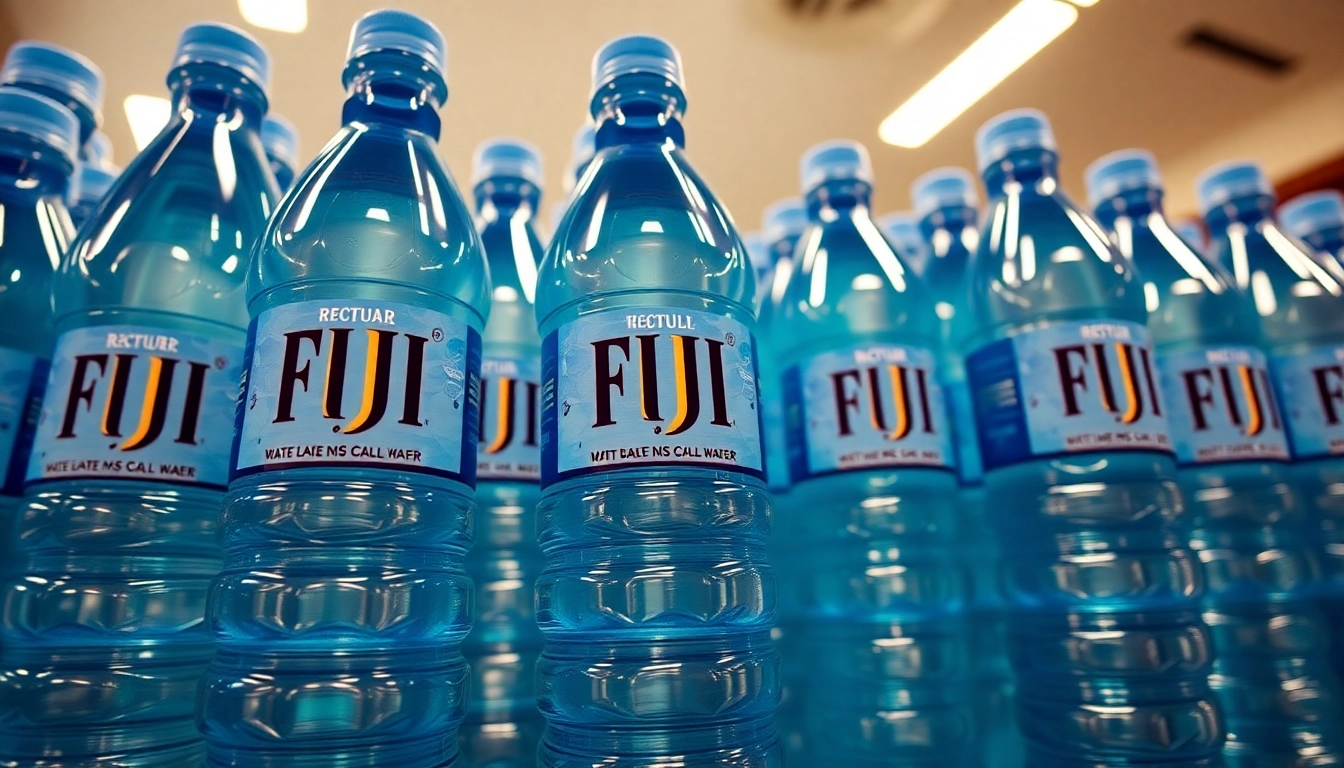Fiji Water Bottles Recalled: What Consumers Need to Know About Contamination Risks

Understanding the Recall: What Happened with Fiji Water Bottles
Overview of the Recall and FDA Involvement
In May 2024, the U.S. Food and Drug Administration (FDA) announced a significant recall of Fiji Natural Artesian Water, impacting nearly fiji water bottles recalled due to contamination concerns. A total of 78,533 cases, equating to approximately 1.9 million individual bottles, were found to have potential health risks. This recall, classified as a Class III, indicates that the recalled products are not likely to cause severe health consequences but may still pose some level of risk to consumers. This swift action by the FDA underscores the regulatory body’s commitment to ensuring public safety in food and beverage products.
Details on Contamination: Bacteria and Manganese
The recall was prompted by the detection of elevated levels of manganese and certain bacteria within the bottled water. Manganese, although a necessary trace mineral for the human body, can be harmful in excessive amounts, particularly to individuals with liver conditions or young children. The FDA found that amounts exceeding safe limits could lead to neurological issues and other health concerns. Additionally, bacterial contamination, particularly when left unchecked, can lead to gastrointestinal problems and other serious health risks.
Timeline of Events Leading to the Recall
The timeline surrounding this recall is critical to understanding how the situation developed. Reports of contamination first emerged in early May 2024, after routine testing identified potential risks within batches of Fiji Natural Artesian Water. By May 23, the FDA publicly announced the recall, urging consumers to stop using the affected products immediately. Following this announcement, Fiji Water’s parent company, Natural Waters of Viti Limited, initiated a series of efforts to investigate the issue and identify the affected batches, reaffirming their commitment to quality and consumer safety.
Health Implications: Risks Associated with Contaminated Bottled Water
Potential Health Risks of Manganese
Manganese is an essential mineral involved in numerous bodily functions, including enzyme activation and hormone regulation. However, high levels of manganese can result in a range of health issues, particularly affecting the brain and nervous system. Chronic exposure to elevated manganese levels can lead to a condition known as manganism, which resembles Parkinson’s disease and can manifest in symptoms such as tremors, stiffness, and slow movement. For this reason, it is crucial for consumers to be aware of potential exposure from contaminated sources, including bottled water.
Bacterial Contamination: Understanding the Dangers
Bacterial contamination in bottled water is a serious concern, as it can introduce harmful pathogens that pose health risks. Common bacteria found in contaminated water include E. coli and Salmonella, which can lead to severe gastrointestinal distress and infections. Symptoms of bacterial infection may include abdominal cramps, diarrhea, and fever. Vulnerable populations, including children, the elderly, and individuals with compromised immune systems, are particularly at risk for serious outcomes from such infections. Understanding these risks emphasizes the importance of ensuring bottled water safety.
Expert Opinions on Bottled Water Safety
Experts in health and nutrition have emphasized the need for rigorous testing and monitoring of bottled water to prevent such contamination events. Many advocate for consumers to take proactive steps, such as checking product labels, staying informed about recalls, and understanding the source of their bottled water. Consumers should also recognize that while bottled water is generally treated and filtered, it is not immune to contamination. Continuous dialogue between manufacturers, government agencies, and consumers is essential to promote transparency and safety in the bottled water industry.
Consumer Actions: What to Do if You Have Recalled Fiji Water
Identifying Recalled Fiji Water Bottles
Identifying whether the Fiji water bottles you possess are part of the recall is the first step toward ensuring your safety. The affected products are primarily the 500 mL bottles, sold under the Fiji Natural Artesian Water brand. It is crucial to check the packaging for the specific batch numbers that fall under the recall. Consumers can find this information through reputable news outlets, the FDA website, or directly from Fiji Water’s communications.
Steps to Take: Refunds and Returns
If you find that you possess a recalled bottle, it is essential to take immediate action. Consumers are advised to cease consumption and return the product to the point of purchase. Many retailers have implemented refund policies for recalled products, and consumers should inquire about these processes. For direct purchases from Fiji Water or authorized distributors, customers may be able to reach out for official return instructions and potential refunds.
How to Report Issues with Contaminated Products
If consumers experience adverse health effects after consuming affected products, it is critical to report incidents to the FDA. The FDA encourages consumers to document any symptoms and reach out through their official reporting channels. Such reports help regulatory agencies track health issues stemming from contaminated products, facilitating improved safety standards in the future.
Lessons Learned: Improving Bottled Water Safety Standards
Current Regulations Surrounding Bottled Water
The bottled water industry is regulated under the FDA, which sets specific standards for safety and labeling. Recent events, such as the Fiji Water recall, highlight the need for ongoing examination of these regulations. Enhancements in testing protocols and stricter adherence to safety practices can bolster consumer protection. Industry discussions could also lead to updates in guidelines regarding contaminant levels, particularly for commercially available bottled water.
Recommendations for Bottled Water Brands
Bottled water brands are strongly encouraged to implement rigorous testing and monitoring to ensure product safety. Regular checks for both chemical and biological contaminants, along with transparent reporting practices, play a vital role in fostering consumer trust. Additionally, companies should invest in improving their sourcing and purification methods to mitigate contamination risks in the first place.
The Role of Consumers in Ensuring Safety
Consumers also play a crucial role in ensuring the safety of bottled water products. Staying informed about recalls, understanding product sourcing, and being proactive about reporting health incidents are essential actions for consumers. Engaging with brands and demanding transparency can motivate companies to maintain higher standards of quality and safety.
Future Outlook: Fiji Water’s Response to the Recall Issue
Company Statements and Actions Post-Recall
In response to the recall, representatives from Fiji Water have issued statements to express their commitment to consumer safety and product quality. They have launched an internal investigation to identify the source of contamination while collaborating closely with the FDA to resolve the recall quickly and efficiently. Public communication efforts have aimed to restore confidence among consumers, emphasizing their dedication to quality control.
Impact on Brand Reputation and Consumer Trust
Recalls can have far-reaching implications for brand reputation and consumer trust. Fiji Water, once a symbol of premium bottled water, faces significant challenges in rebuilding its image following the recall. Swift and effective actions to address safety concerns, coupled with transparent communication, are vital for regaining consumer trust. Continued engagement with the public and responsive customer service will be essential elements of their strategy moving forward.
Future Safety Measures Implemented by Fiji Water
This incident has prompted Fiji Water to reevaluate its safety measures and protocols. Moving forward, companies in the bottled water industry, including Fiji, are likely to adopt more stringent monitoring of their products and supply chains. Emphasizing preventative measures, such as enhanced filtration methods and regular testing, will be critical in promoting long-term safety and preventing future contamination incidents.







